Are you interested in becoming a solicitor, with or without a legal background? Would you like to skip all those years and expenses it takes to get a traditional legal degree? Would you like to be able to study and pass the SQE exam in a way that suits your life and environment?
We can help you to achieve your goal of qualifying as a solicitor of England and Wales!
Take the next step in your SQE preparation with our specialised support for:
How to qualify as a solicitor
Prior to the development of the SQE exam, the route to qualifying as a solicitor in England and Wales was quite daunting and expensive. It was also difficult for the SRA itself to administer the process, which involved monitoring the structure and methods of different courses, providers, and training contracts.
Until now, domestic candidates needed to meet the following requirements to be admitted to the roll of solicitors in England and Wales:
- Academic stage: Obtain a qualifying law degree (QLD) such as the LLB, or combine a non-law degree with a postgraduate Common Professional Examination (CPE) or Graduate Diploma in Law (GDL)
- Vocational training: Complete a postgraduate Legal Practice Course (LPC)
- Secure and complete a 2-year training contract
- Pass the Professional Skills Course (PSC) (usually during the training contract)
- Note: Members of the Chartered Institute of Legal Executives (CILEx) and Assistant Justices’ Clerks who have served for five out of the previous ten years in the Magistrates’ Courts Service do not need to complete a training contract. These candidates must still complete the LPC exam and the core modules of the PSC.
You can see that this process to obtain solicitor qualifications is long, arduous, and expensive whether you go for a training contract or via CILEx. Even after obtaining the necessary qualifications, many candidates struggle to secure a training contract and thus never manage to complete the qualification process; although the precise numbers are difficult to determine, we estimate that there are many candidates who have completed the LPC exam over the last 10 years, but have been unable to qualify due to the difficulty in obtaining a training contract! Take it into account while weighing SQE vs LPC.
Qualified lawyers from a foreign jurisdiction had to complete the Qualified Lawyers Transfer Test (QLTT) to practise in England and Wales. This was replaced in 2010 by the Qualified Lawyers Transfer Scheme (QLTS), which was designed and piloted as a prototype for the SQE, with two stages:
- Multiple Choice Test (MCT)
- Objective Structured Clinical Examination (OSCE)
After engaging with all stakeholders and implementing feedback on the QLTS, the SRA finalised the design of the SQE and launched it in September 2021 as a single pathway for all who would like to achieve their goal of becoming a solicitor in the UK.
Note: Traditional law degree or LPC students who have already started their courses before 1 September 2021 can still continue and qualify on this pathway. Note, you still have an option to choose SQE or LPC and complete the solicitors’ qualification via SQE.
What is the SQE?
In September 2021, the Solicitors Regulation Authority (SRA) launched the Solicitors Qualifying Examination (SQE).
Meaning of the Solicitor Qualifying Examination. The Solicitors Qualifying Examination (SQE) is the assessment process for becoming a solicitor in England and Wales. It replaces the traditional Legal Practice Course (LPC) and consists of two stages:
- SQE1 exam: Tests legal knowledge through multiple-choice questions.
- SQE2 exam: Assesses practical legal skills, including client interviewing, advocacy, legal research, and drafting.
It is designed to provide a more flexible and accessible route to qualification, allowing candidates to qualify without a traditional law degree by completing qualifying work experience (QWE). SQE is a single, centralised, national licensing examination administered by Kaplan on behalf of the SRA. This new structure will make the process of joining the solicitors register UK much more accessible and affordable. It will also provide consistency and fairness in the qualification process, while thoroughly testing each candidate’s knowledge, skills, and competency through robust assessments.
The requirements for qualifying as a solicitor are now as follows:
- Obtain an undergraduate degree in any subject (it does not need to be a law degree), or equivalent qualification or apprenticeship
- Pass SQE stages one and two (see below for more info)
- Complete two years of Qualifying Work Experience (QWE) (see below for more info)
- Meet the SRA character and suitability requirements.
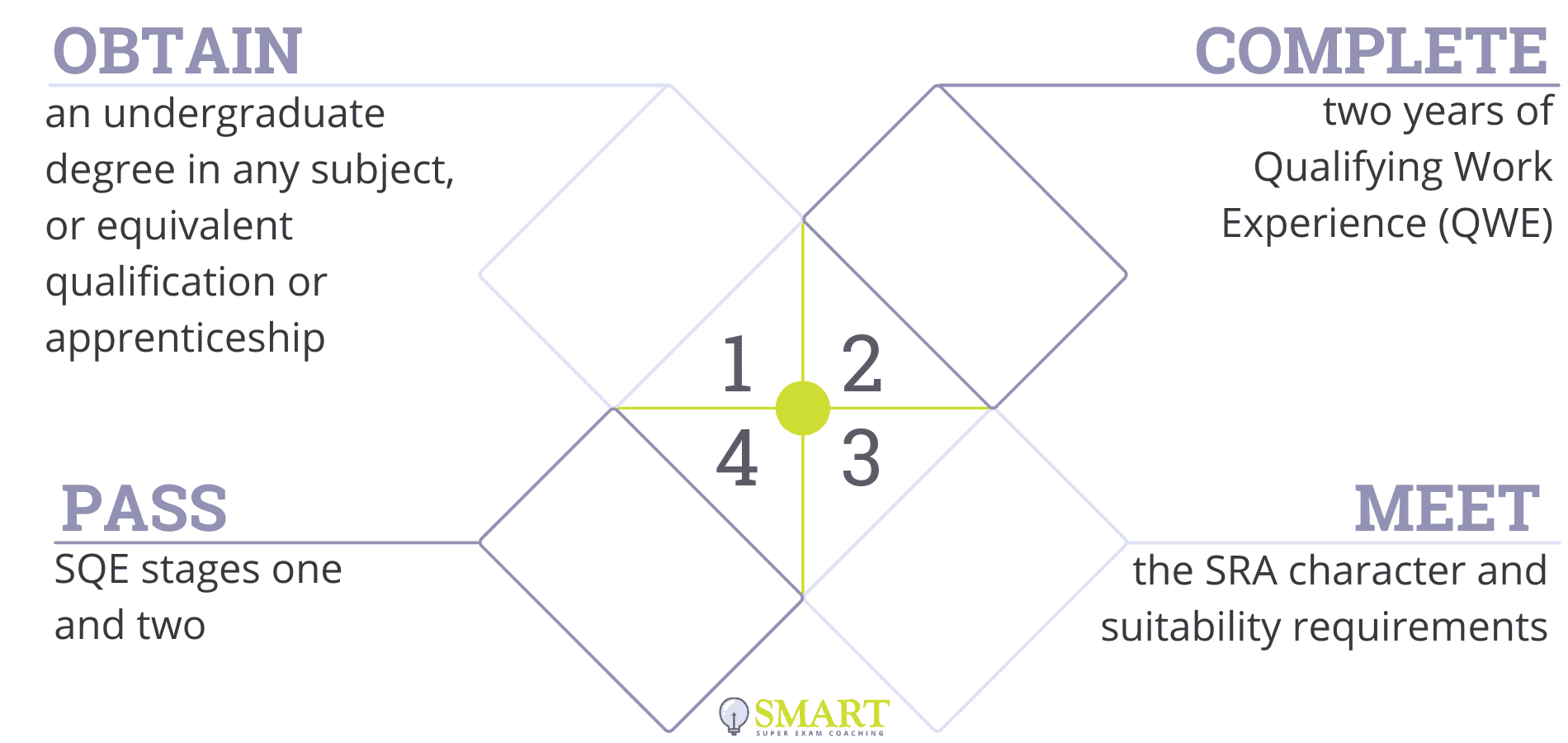
SQE1: Stage One
SQE1 is a computer-based multiple-choice assessment intended to test the candidate’s application of functioning legal knowledge (FLK) to realistic client-based scenarios. There are two exams, each containing 180 questions in different areas of substantive and procedural law:
- FLK Assessment 1: Business Law and Practice, Dispute Resolution, Contract, Tort, Legal System of England and Wales, Public Law, Legal Services
- FLK Assessment 2: Property Law and Practice, Wills and Administration of Estates, Solicitors Accounts, Land Law, Trusts, Criminal Law and Practice
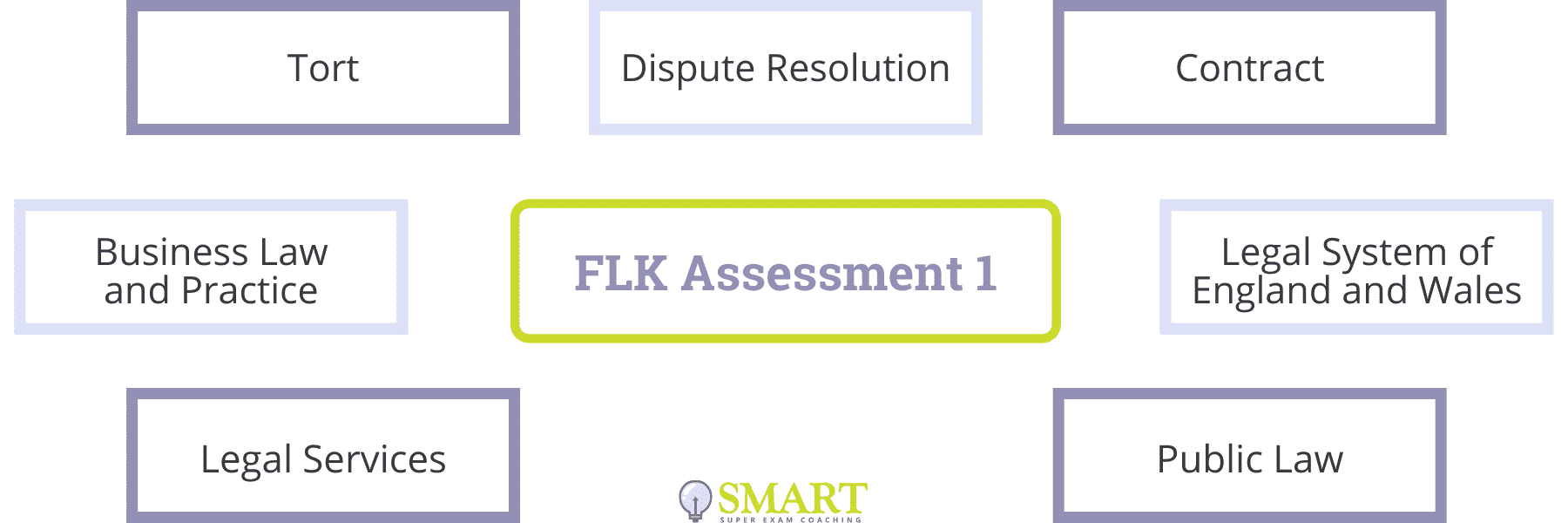
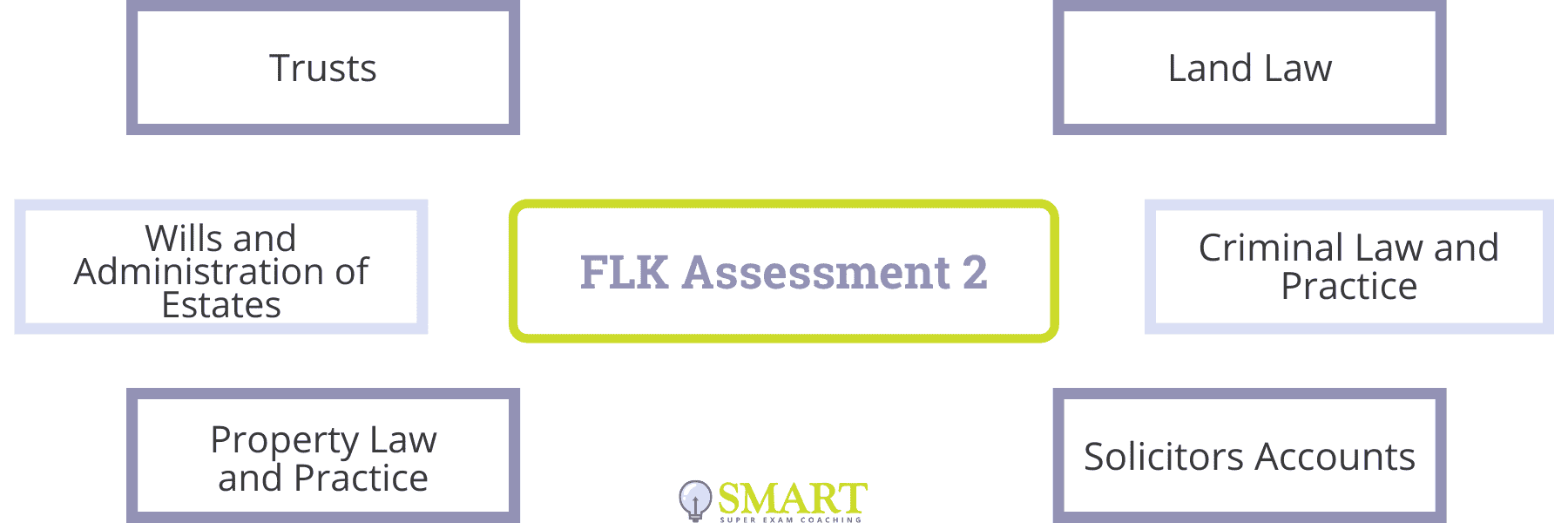
Each question has five potential answers. You will need to assess the details and facts of the question and draw upon your knowledge of the relevant legal principles to select the single best response. Note: there are no “none/all of the above” answers.
The SQE One assessment is offered across two days with a total duration of about 10 hours (5 hours for each assessment). You must pass this stage of the SQE before progressing to SQE Two.
For law students hoping to become barristers, the Bar Standards Board has indicated that, pending further consultation with the SRA, passing SQE1 should be also sufficient as equivalent to the academic component of Bar training.
Learn more about the SQE1 preparation and assessment in our article, or on the SRA website.
When it comes to preparation, you can build up your knowledge of the law through reading textbooks, but the best way to apply that knowledge and pass an exam like this is to answer multiple-choice questions in an SQE mock exam environment.
SQE2: Stage Two
SQE2 is an oral and written examination that tests the candidate’s practical legal skills.
This stage of the examination will involve 16 written and oral tasks (known as “stations”), including role-playing or simulating tasks as would be carried out by an actual solicitor. Candidates are assessed on their application of the following skills:
SQE oral:
SQE written:
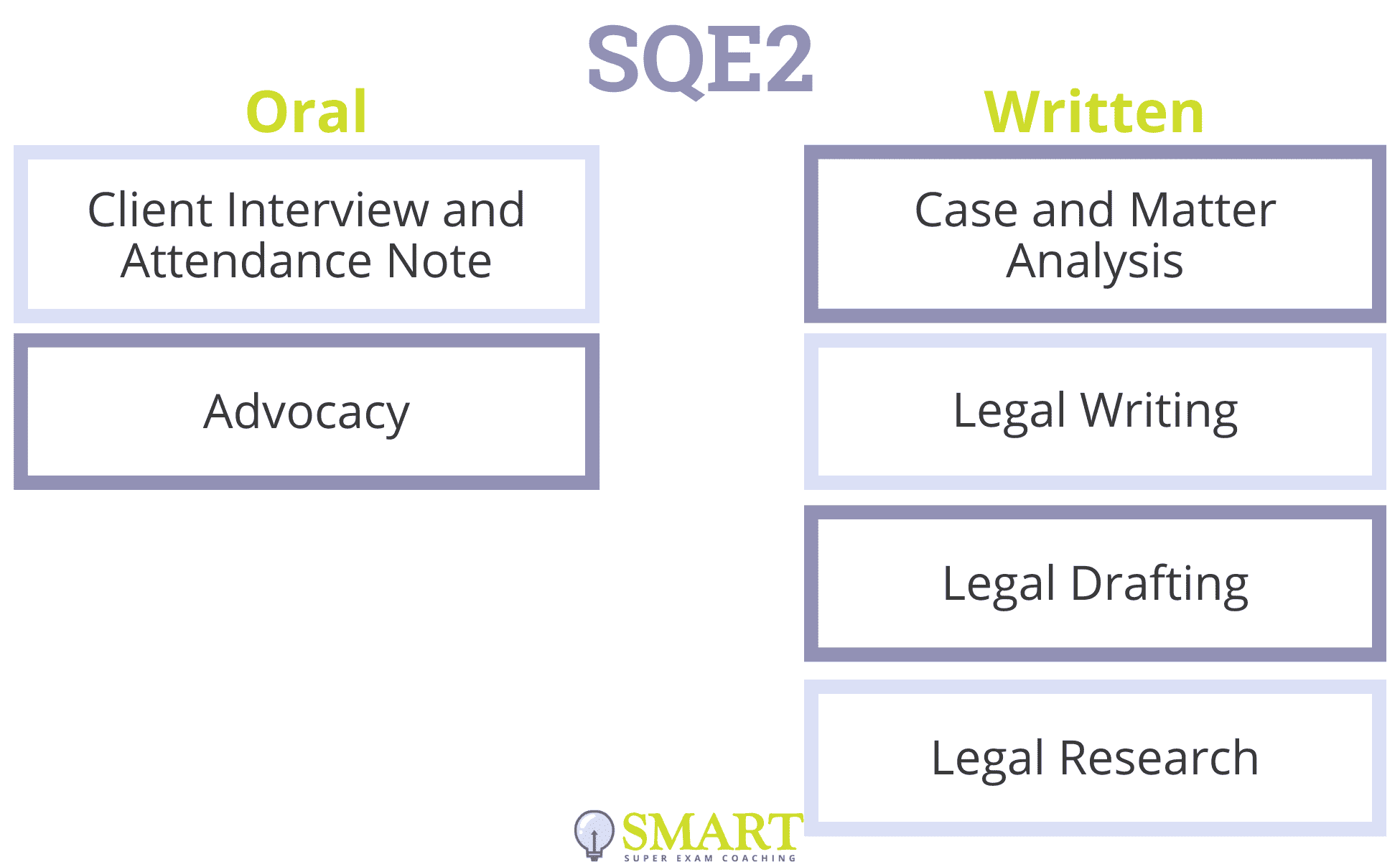
SQE2 is carried out across five practice areas or contexts:
- Criminal Litigation
- Dispute Resolution
- Property Practice
- Wills and Intestacy, Probate Administration and Practice
- Business Organisation Rules and Principles
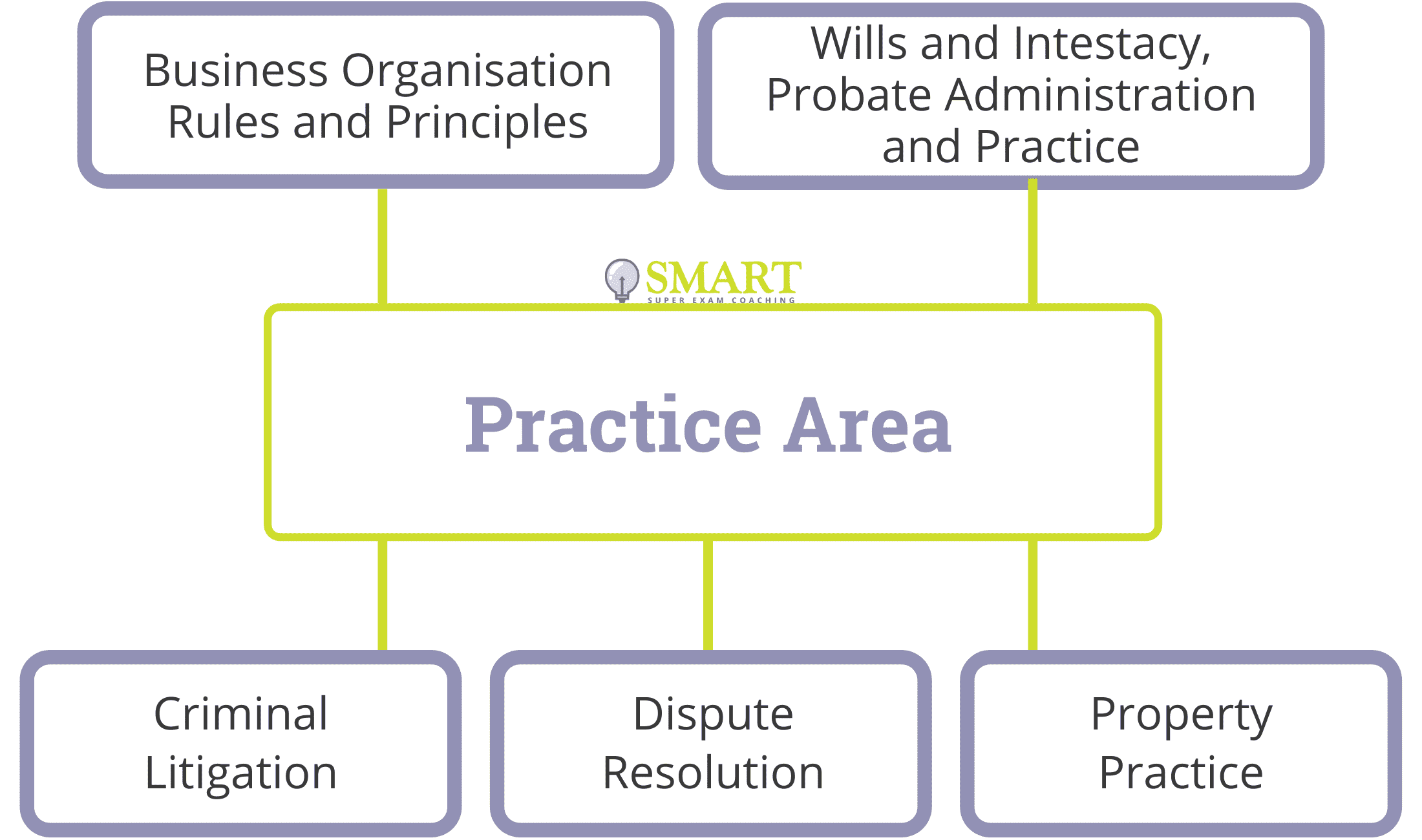
The SQE Two assessment is offered across five days with a total duration of about 14 hours. There are four SQE oral assessments over two half-days, and 12 SQE written assessments over three half-days.
More information about the SQE2 assessment can be found here and on the SRA website.
When preparing for this assessment, textbook knowledge will certainly not be enough to perform the practical tasks required. Our SQE2 prep course offers study materials and video lectures, as well as one-to-one mock stations with personalised tutor feedback. Our unique approach tests your knowledge of different legal concepts within each area of law to help you identify any gaps in your knowledge that you need to focus on to pass this difficult stage of the examination.
SQE Exemptions: Who Qualifies?
The Solicitors Regulation Authority (SRA) allows exemptions from entire SQE1 or SQE2 assessments – but only when candidates can prove that their previous qualifications and experience are fully equivalent to one or both SQE exams.
SQE1 exemptions are extremely rare. You must demonstrate comprehensive legal knowledge covering both FLK1 and FLK2 of the SQE exam; in the past three years, only one candidate has ever succeeded .
SQE2 exemptions are more attainable for experienced lawyers. If you have at least two years’ relevant legal work – in areas like litigation, property, probate, or business law – and can show practising rights, you may qualify.
To apply, candidates must compile detailed evidence such as qualifications, work samples, references, and jurisdictional comparisons. While these exemptions can accelerate your solicitor journey, they require meticulous documentation and alignment with SRA standards.
Qualifying Work Experience (QWE)
You can complete your QWE at any time during the qualification process, so before, after, or even at the same time as pursuing a solicitor course and taking the SQE1 and SQE2 assessments. It is expected that most candidates will start their QWE after passing stage 1 of the SQE. Candidates must accumulate a total of two years full-time (or equivalent) experience in up to four different organisations (at least six months in each). This allows for much more flexibility than the traditional two-year training contracts in one firm, which were strictly regulated and often difficult to obtain.
QWE must be completed in law firms or in legal services roles in other organisations, and must allow the candidate to develop the core skills and competencies needed to practise as a solicitor. This could include work experience such as:
- Paralegal work
- Law apprenticeships
- Working in a legal clinic
- Volunteering in a charitable organisation
- Work placements during a law degree
QWE must be confirmed by a solicitor of England and Wales (either within the organisation or by a solicitor outside the organisation with direct knowledge of the work performed), or by a Compliance Officer of Legal Practice (COLP). Confirmation of QWE does not include confirmation that the candidate is competent to practise – the SQE will test this directly.
SQE Exam Preparation Courses by the Academy of Smart Lawyers
The introduction of the Solicitors Qualifying Examination (SQE) has transformed the route to becoming a solicitor in England and Wales. With no requirement for a qualifying law degree, aspiring solicitors now have greater flexibility in how they prepare for the SQE exam. While formal training is not mandatory, embarking on the SQE journey without structured preparation is risky and often counterproductive. The Solicitors Regulation Authority (SRA) does not regulate or monitor SQE course providers; its focus is solely on the candidate’s performance in the SQE assessments.
As a result, SQE training courses vary significantly in structure, quality, and cost. University-based programmes can range from £500 to over £16,500. Online SQE1 courses typically fall around £3,000, though pricing and content offerings continue to evolve.
Why Choose the Academy of Smart Lawyers?
We are not new to SQE-style training. Our origins lie in preparing candidates for the QLTS – the direct precursor to SQE exam. Since 2018, our academy has supported aspiring solicitors from diverse legal and cultural backgrounds through a unique blend of academic excellence and real-world experience.
Almost all our tutors are qualified solicitors who have passed the QLTS or SQE themselves. Many continue to practise law today. They understand what the SQE exam demands because they have experienced it first-hand. Our ethos is to pass that practical knowledge on to our candidates.
Our SQE Exam Training Philosophy
At the core of our SQE course is practice-based learning. We believe that performing realistic legal tasks, making mistakes in a safe environment, and receiving detailed feedback are the most effective ways to prepare for this professional exam. The SQE exam is not just about theory – it’s about showing you can apply your legal knowledge in practice.

Flexible SQE1 Courses – FLK1 and FLK2 Options for Resitters
We offer highly flexible SQE1 preparation options tailored to both first-time takers and resitters. For those who need to retake either FLK1 or FLK2, we provide targeted individual packs that allow focused revision without having to repeat the full course. These include:
- Access to live and recorded lectures
- Comprehensive SQE1 revision notes and MCQs
- Tutor Q&A sessions and support forums
- Diagnostic mock tests to help assess readiness
Our platform enables students to concentrate on exactly what they need to pass the SQE1 exam — efficiently and affordably.
Flexible SQE2 Course Packages
We offer a wide range of SQE2 training packages tailored to different budgets, timelines, and study preferences. Whether you’re looking for comprehensive preparation or specific support in certain practice areas, our packages are modular and fully customisable. You can mix and match our services to meet your needs.
Highlights of our SQE2 preparation courses include:
- Tutor-led video lectures and interactive study materials
- 1-to-1 mock sessions simulating SQE2 exam stations
- Personalised tutor feedback on performance
- Lifetime access to our virtual classrooms and materials
- Realistic simulations with suggested answers
Our pricing starts from just £105 per mock station, with transparent costs and discounts for bundle purchases.
For Law Firms and In-House Training
The Academy of Smart Lawyers also offers tailored solutions for law firms and institutions. Our proprietary SQE platform, SUPERexam, provides a dedicated learning environment where firms can deliver in-house training and assessments to trainees. We also support onboarding, compliance training, and mock simulations for firm-specific case types.
Our upcoming tutor training programme will enable law firms to train their own solicitors as in-house SQE tutors, further embedding professional development within the firm.
Whether you’re an individual preparing for the SQE exam or a firm managing in-house qualification, the Academy of Smart Lawyers offers a practical, sustainable solution built on real experience and measurable success.
How much will the SQE exam cost?
The total fee for taking both SQE1 and SQE2 assessments from September 2025 is £4,908:
- SQE1 – £1,934
- SQE2 – £2,974
There will be two sittings of the SQE1 law exam and four sittings of the SQE2 per year. Candidates are allowed to attempt each stage of the Solicitor Qualifying Exam up to three times in a six-year period.
I am a foreign qualified lawyer and have worked as an in-house lawyer for more than a decade. How will I fulfil the “working” criteria? Am I exempt?